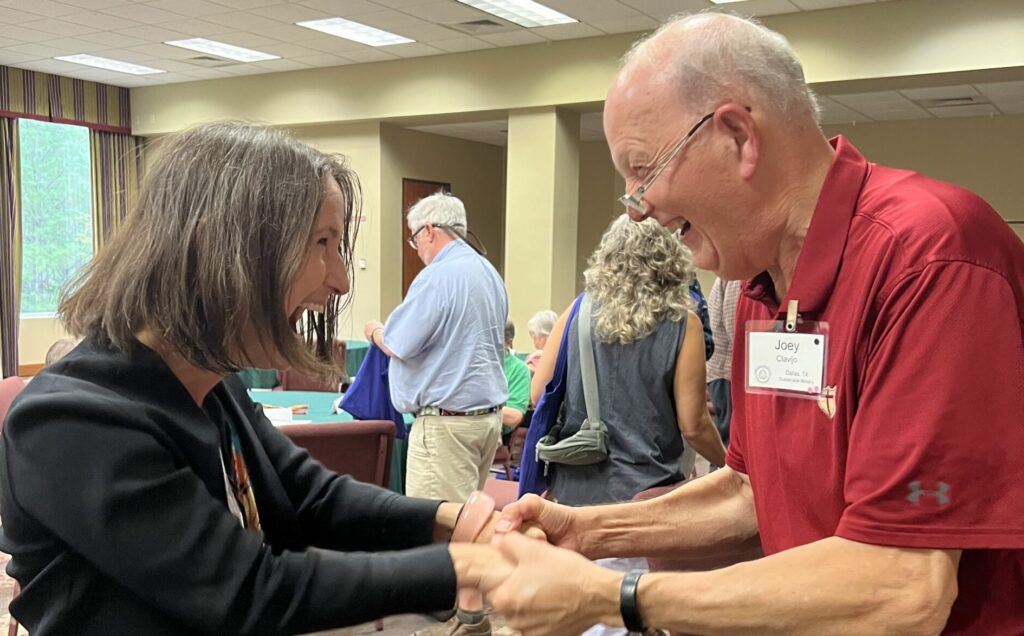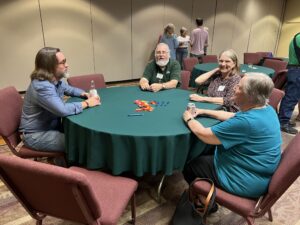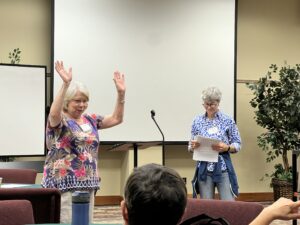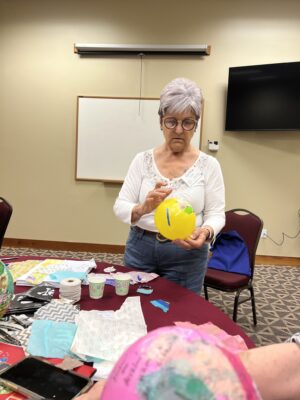
By Melanie P. Moore
Roxana Videla started attending All Saints Episcopal Church in Meriden, Connecticut, the day after she arrived in the United States from Argentina with her four children. Her husband, Sergio, was already in the U.S. and had found a job in Meriden. Today, she is the Rev. Deacon Roxana, Pastoral Assistant at Christ Church Cathedral in Hartford and will be ordained to the priesthood on January 6, 2024.
“We came to the country with only our clothes,” she said recently during the Iona Collaborative’s Thriving in Bi-Vocational Ministry Annual Retreat at Camp Allen in Navasota, Texas. “The church helped us find an apartment and everything we needed. I plan to help immigrant women,” she said. Recently, she teamed with an immigration lawyer for an event.
“Now more (immigrant) women come to church and it’s important for them to feel more comfortable with a woman.” Not just any woman, but this woman who speaks their language and has traveled their path.
 As the Iona Collaborative’s Thriving in Bi-Vocational Ministry program reaches its five-year mark, it has served more than 174 priests, deacons, and now lay leaders who are bi-vocational, where bi-vocational means they are pastoral leaders with an additional job but also that they were trained and certified through local schools of formation. There are an additional 55 people in the program this year.
As the Iona Collaborative’s Thriving in Bi-Vocational Ministry program reaches its five-year mark, it has served more than 174 priests, deacons, and now lay leaders who are bi-vocational, where bi-vocational means they are pastoral leaders with an additional job but also that they were trained and certified through local schools of formation. There are an additional 55 people in the program this year.
Funded by a grant from the Lilly Endowment, Inc., the Thriving in Bi-Vocational Ministry program supports clergy across their entire career, from discernment through classes, formation, and all steps of the process to ordination. The Iona Collaborative, made up of 35 Dioceses with local schools of formation, provides what some term an alternative path to ordination. These clergy are trained locally in their dioceses, not at a traditional residential seminary. And while some dioceses require those who are ultimately ordained to pass the same General Ordination Examination (GOE) that traditionally-formed Episcopal clergy take, all Iona Collaborative graduates complete the local schools with a certificate, not a Masters degree. Most Iona formation schools train students in ethics, theology, church history, and Bible. But the Iona Collaborative is finding that because many programs have fewer instructional hours than a traditional seminary education, sometimes clergy feel less confident in skills such as preaching, pastoral care, spiritual formation, and church administration—the things they do every day in their parishes. The Thriving in Bi-Vocational Ministry program fills this gap with practical, skills-based learning.
 The Lilly Endowment, Inc., conducted research showing that clergy need to feel connected and need peer groups and mentors in order to thrive. The Iona Collaborative’s Thriving in Bi-Vocational Ministry program is strategically meeting those needs, supporting this diverse group of church leaders scattered across the U.S. by nurturing a vibrant network of colleagues and mentors. Most of the Iona schools work in a cohort structure where the students are inherently connected with their peers and mentors. The Bi-Vocational method of training clergy can build robust, sustainable community because in this local formation model, students come together, learn together, and then serve together—connected by continuing education with their cohorts via Zoom plus the annual in-person retreat in Texas. Priests, Deacons, and Lay Leaders all participate in the continuing education and retreat.
The Lilly Endowment, Inc., conducted research showing that clergy need to feel connected and need peer groups and mentors in order to thrive. The Iona Collaborative’s Thriving in Bi-Vocational Ministry program is strategically meeting those needs, supporting this diverse group of church leaders scattered across the U.S. by nurturing a vibrant network of colleagues and mentors. Most of the Iona schools work in a cohort structure where the students are inherently connected with their peers and mentors. The Bi-Vocational method of training clergy can build robust, sustainable community because in this local formation model, students come together, learn together, and then serve together—connected by continuing education with their cohorts via Zoom plus the annual in-person retreat in Texas. Priests, Deacons, and Lay Leaders all participate in the continuing education and retreat.
 “We have learned through working with the Bi-Vocational world for many years now that thriving for leaders is about two things,” said Program Director Rebecca Hall. “First, feeling equipped and competent for ministry. For example, if they didn’t get enough hours in preaching education, our program aims to come alongside them to help them be a better preacher; and second, to keep them connected through continuing education cohorts that start in September, last one or two semesters, meet regularly on Zoom, and are topically focused.”
“We have learned through working with the Bi-Vocational world for many years now that thriving for leaders is about two things,” said Program Director Rebecca Hall. “First, feeling equipped and competent for ministry. For example, if they didn’t get enough hours in preaching education, our program aims to come alongside them to help them be a better preacher; and second, to keep them connected through continuing education cohorts that start in September, last one or two semesters, meet regularly on Zoom, and are topically focused.”
The Thriving in Bi-Vocational Ministry Annual Retreat in September gave these folks a chance to visit in person between learning sessions that followed three tracks: Preaching, Nurturing Our Creative Selves, and Living into the Household of God: Essentials for Sustainable Ministry. An example of the agile training and support the program provides is that, at the retreat, the Rev. Dr. Jane Patterson, who led the Preaching track, came prepared to help them preach about Matthew (which was coming up in the lectionary). But what she found was that they really wanted deeper instruction on how to write a sermon.
“I was blown away by the answers the retreatants in my cohort gave to an introductory question about the context of their ministry,” she said. “They are serving in congregations of from five to 800 people on an average Sunday. They serve among African American, Hispanic, White, and Indigenous people. They serve in a federal prison, in schools, on Zoom, in congregations that are vibrant and congregations that may close, in urban centers and tiny towns, and as far away as Delhi and Dubai. They represent Episcopal traditions, but they are also on the forefront of what the Episcopal Church is becoming now. It was an honor to be with them.”
A testament to the high quality of the instructors at the retreat is the way Patterson re-focused her presentations, keenly aware that her audience had a real need for basic, practical tools. The success of her adjustment was evident in the follow-up evaluations where students gave high ratings with comments like, “Jane’s sessions have already helped me in my preaching,” and “…the instruction encouraged me to lean into my call and gift as a preacher and to trust my instinct and voice.”
Of the Living into the Household of God: Essentials for Sustainable Ministry track at the retreat, led by the Rev. Jerry Cappel, Dr. John Gatta, and Dr. Collin Cornell, all of the Deep Green Faith Center.
“While this was called a retreat, in class it was a workshop, where these soulful, smart people worked really hard at deepening their ministry,” Cappel said. Based on comments in the evaluations, this track proved equally meaningful: “My experiences in the sustainability cohort have grounded me with the grace ever present in the mystical presence within everything becoming” and “Sustainability gave me a new perspective on the ecological system and what we need to do as a church.”
“These parishes ARE the church,” Patterson said. The Bi-Vocational ministers serve parishes that can’t afford a full-time rector—a subset of Episcopal churches in the U.S. that is steadily increasing and currently accounts for over 50 percent of the nation’s parishes. The majority of the Bi-Vocational clergy serve small rural churches in the U.S. as far-flung as New Mexico, Minnesota, Michigan, Maryland, Texas, California, and Oklahoma.
The overwhelming sentiment of retreat attendees reflected the power of the “connective tissue” provided through the program’s intentional orchestration of the two continuing-education prongs of regular Zoom topic-based conversations and the in-person retreat—especially the retreat. What was the most impactful part of the retreat? “Meeting colleagues and solving ministry dilemmas together,” “Being together in person is really the best way to build a more sustainable, cohesive, and safe group,” and “Seeing how the Holy Spirit is at work … that our differences are what drive our oneness.”

